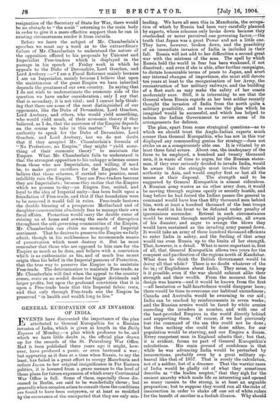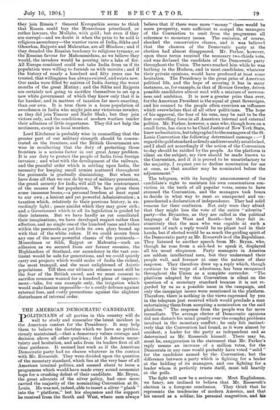tion of which by Russia bad been very carefully planned
by experts, whose schemes only broke down because they overlooked or never perceived one governing factor,—the truth that Japan was a great Power and not a little one. They have, however, broken down, and the possibility of an immediate invasion of India is included in their fall. Russia will not add to her difficulties a second great war with the mistress of the seas. The spell by which Russia held the world in fear has been weakened, if not dissolved ; and even if she is able, after further campaigns, to dictate honourable terms of peace to Japan, and avert any internal changes of importance, she must still devote ten years at least to the reorganisation of her Army, the reconstruction of her military railways, and the building of a fleet such as may make the safety of her coasts moderately sure. Still, it is interesting to see that the General whom Russia regards as her best soldier recently thought the invasion of India from the north quite a military possibility, and to examine the plan which he imagined would be successful, and which has helped to induce the Indian Government to revise some of its arrangements for defence.
The plan, apart from some strategical questions—as to which we should trust the Anglo-Indian experts muck sooner than General Kuropatkin, who has not in this war displayed any commanding genius for strategy—does not strike us as a conspicuously able one. It is vitiated by at least three fatal errors. About one, the inadequacy of the force to be employed, a hundred and twenty thousand men, it is waste of time to argue, for the Russian states- men, if they ever seriously decided to invade India, would. be aware that the struggle must involve their whole authority in Asia, and would employ first or last all the means at their disposal. The strength said to be suggested by General Kuropatkin is almost ridiculous. A Russian army wastes as no other army does, it would be moving through regions openly or secretly hostile, and long before he bad forced the Indian passes the general in command would have less than fifty thousand men behind him, with at least a hundred thousand of the best troops in the world in his front to be defeated under penalty of ignominious surrender. Retreat in such circumstances would be retreat through martial populations, all aware of his disaster, and eager to avenge the blows they would have sustained as the invading army passed down. It would take an army of three hundred thousand efficients to enter India in safety, and the feeding of that army would tax even Russia up to the limits of her strength. That, however, is a detail. What is more important is, first of all, that General Kuropatkin allows two years for the conquest and pacification of the regions north of Kandahar. What does he think the British Government would be doing all that while ? There is no doubt whatever of the fee' in, of Englishmen about India. They mean to keep it if possible, even if the war should exhaust alike• their strength and their wealth. From the moment that the design was known—and it would be known from the first —all hesitation or half-heartedness would disappear here; there would be time to overcome our habitual unreadiness ; Canada and Australia would be swarming to our aid ; India can be reached by reinforcements in seven weeks; and the Russian armies would be faced by white armies exceeding the invaders in number, and with one of the best-provided Empires in the world directly behind and supporting them. Of course, if we had previously lost the command of the sea this could not be done, but then nothing else could be done either, for our population would be starving, and our Empire a dream. Every competent man in England admits that ; but that, it is evident, forms no part of General Kuropatkin's calculations. His main ground of confidence is that while he was advancing India would be perturbed by insurrections, probably even by a great military up- heaval like that of 1857. That is surely the calculation, not of a soldier, but of a dreamer. That the warrior races of India would be gladly rid of what, they sometimes describe as "the leaden sceptre," that they sigh for the ancient anarchy which made life so interesting and opened so many careers to the strong, is at least an arguable proposition; but to suppose they would run all the risks of insurrection in order to shake off one set of white rulers for the benefit of another is a foolish illusion. Why should they join Russia ? General Kuropatkin seems to think that Russia could buy the Mussulinan priesthood, or rather lawyers, the Mullahs, with gold ; but even if they are corrupt—and we doubt it when the prize to be sold is religious ascendency—the warrior races of India, Sikhs and Ghoorkas, Rajputs and Mahrattas, are all Hindoos ; and if they dreaded the Russian tendency to religious tyranny, or the Russian favour for Mahommedans, as we believe they would, the invaders would be pouring into a lake of fire. All Europe combined could not take India from us if its population were willing to furnish us with recruits ; and if the history of nearly a hundred and fifty years can be trusted, that willingness has always existed, and exists now. Our ranks were filled by natives of India during the worst months of the great Mutiny ; and. the Sikhs and Rajputs are certainly not going to sacrifice themselves to set up a new white government of which they know only that it is far harsher, and in matters of taxation far more exacting, than our own. It is true there is a loose population of swordsmen in India who might join any victorious invader, as they did join Timour and Nadir Shah ; but they join victors only, and the conditions of modern warfare render their adhesion of little importance. They did not help the mutineers, except in local murders.
• Lord Kitchener is probably wise in counselling that the greater part of our military strength should be concen- trated on the frontiers, and the British Government are wise in recollecting that the duty of protecting those frontiers is a serious factor in our great Army problem. It is our duty to protect the people of India from foreign invasion ; and what with the development of the railways, and the peaceful order which is settling upon India, the necessity for keeping small armies scattered throughout the peninsula is gradually diminishing. But when we have done all that we can do by way of military precaution, the grand security for India will still be the contentment of the masses of her population. We have given them some immense boons,—a personal freedom at least equal to our own ; a lenient and yet powerful Administration; a taxation which, relatively to their previous history, is ex- ceedingly light ; peace amidst which they may grow rich ; and a Government which in all its legislation is guided by their interests. But we have hard; as yet conciliated their imaginations, we have developed respect rather than affection, and no single one of the hundred races and tribes within the peninsula as yet feels its own glory bound up with that of the white rulers. If we could. secure from any one of the more powerful classes of the peninsula- Mussulman or Sikh, Rajput or Mahratta—such an adhesion as we secured from our former enemies, the Highlanders of Scotland, our ascendency in the vast con- tinent would be safe for generations, and we could quietly carry out projects which would make of India the richest, the most tranquil, and. the most enlightened of Asiatic populations. Till then our ultimate reliance must still be the fear of the British sword, and we must consent to sacrifice revenues wanted for a hundred plans of improve- ment—take, for one example only, the irrigation which would make famine impossible—to a costly defence against external foes, and costly precautions against the slightest disturbance of internal order.



































 Previous page
Previous page